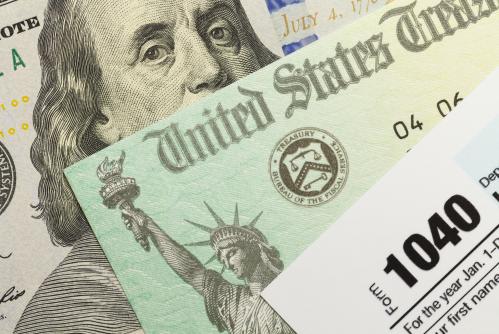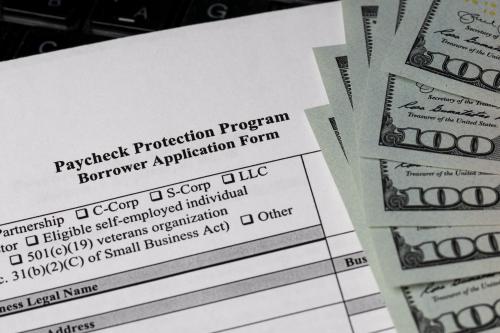This op-ed originally appeared in Barron’s on July 25, 2020.
Americans are likely to get a second round of direct payments as part of the next Covid recession stimulus package. Congress ought to learn the lessons from the first round and move that money much more quickly into people’s pocketbooks. All it would take is changing one sentence in the law that structures our nation’s payment rules. If Congress does nothing, billions will end up going to check cashers, payday lenders, and bank overdraft fees, doing little to help families in distress or stimulate the economy.
The first round of direct Covid payments had a lot of problems. Start with the lucky citizens Treasury paid first because it sent payments directly to their bank account through direct deposit. The secret about direct deposit: “direct” means “electronic,” not “instant.” In reality, it took three weeks for the money to be sent and another six days for that money to go to people’s pockets. How can that be?
Treasury sent the money to people’s bank accounts sometime on Good Friday, but people could not access it until the following Wednesday. A few banks chose to give consumers early access; after all, a Treasury check is not going to bounce. Most simply followed regular practice and sat on the funds. There is no good reason for this delay, other than the law allows it, banks profit from both interest on the funds and fees when people overdraft, and the Federal Reserve has chosen not to use its regulatory authority to force banks to give people access faster.
But that’s just the beginning of the delays: 70 million to 100 million people waited one to three months for money that eventually arrived as a paper check or debit card. But because of how America’s payment system is structured, getting a check in the mail means even longer delays. Even when the check is from Uncle Sam, hidden and unexpected costs soar for those who need money the most.
Consider the case of a family of four who finally received their $3,400 stimulus check on Friday, May 29, as some surely did. If they took it to the bank, the money wouldn’t be available until Tuesday, June 2, at the earliest. The delay could mean missing a rent payment due at the end of the month. Running out of money would mean overdraft fees of $35 for every purchase made or payment due in between. All of a sudden spending $75 at a check casher to get immediate access becomes the least-cost solution. Is putting money in the hands of check cashers and payday lenders how we want to stimulate the economy?
These problems are widespread. Half of Americans live paycheck to paycheck. One out of 12 Americans spend more than $300 a year on bank overdraft fees. There are more payday loan stores in America than McDonald’s restaurants for a reason: People use them and pay a lot to do so. Concerns about faster payments leading to fraud have proven not to be the case in countries like the U.K. that adopted real-time payments more than a decade ago. And in this instance, we are only talking about payments sent by Uncle Sam, who is good for it.
Creating a world where emergency financial assistance streams as quickly as Netflix is actually quite easy. Changing a single line of law would go a long way. The Expedited Funds Availability Act of 1987 governs how long banks are allowed to hold your money. The law has a specific timetable for checks from the Treasury Department that allow funds to be held by the bank “not later than the business day after the business day on which such funds are deposited.” Two business days frequently means five days or more in the real world.
Changing this one line to “immediately” would save people millions in bank overdrafts, check cashing fees, late fees, unnecessary payday loans, and countless other hardships and anxieties. Delays in our payment system are an example of why it is expensive to be poor. The Fed has the legal ability to fix this problem but has chosen not to, instead focusing on building a new payment system that it hopes will be ready in 3 to 4 years. Likewise, new proposals to require universal consumer accounts at the Fed or the Post Office may or may not be good ideas but cannot address this problem today.
The 40% of American mothers with children who are food insecure in the midst of this recession simply can’t afford to wait. The Fed has plowed hundreds of billions of dollars into providing liquidity for the nation’s largest businesses. It ought to prioritize the over 100 million Americans who live on the financial edge. If the Fed refuses to act, Congress must. Legislation in both the Senate (introduced by Sens. Chris Van Hollen and Elizabeth Warren) and House (by Reps. Ayanna Pressley and Jesús “Chuy” García) would fix this. Congress must incorporate it as part of the next Covid response package if they want to achieve the President’s reasonable goal of getting money to people as quickly as possible.
Rarely do we have a second bite at the apple to fix a policy mistake so quickly. Eliminating the time banks can hold onto people’s money means real savings for those who have the least. This progressive policy costs the federal government nothing. Treasury and the Fed are working triple time to provide businesses money quickly. How about doing that for the rest of us?





Commentary
Op-edWant your next stimulus check faster? Congress needs to change just one line of law
July 27, 2020